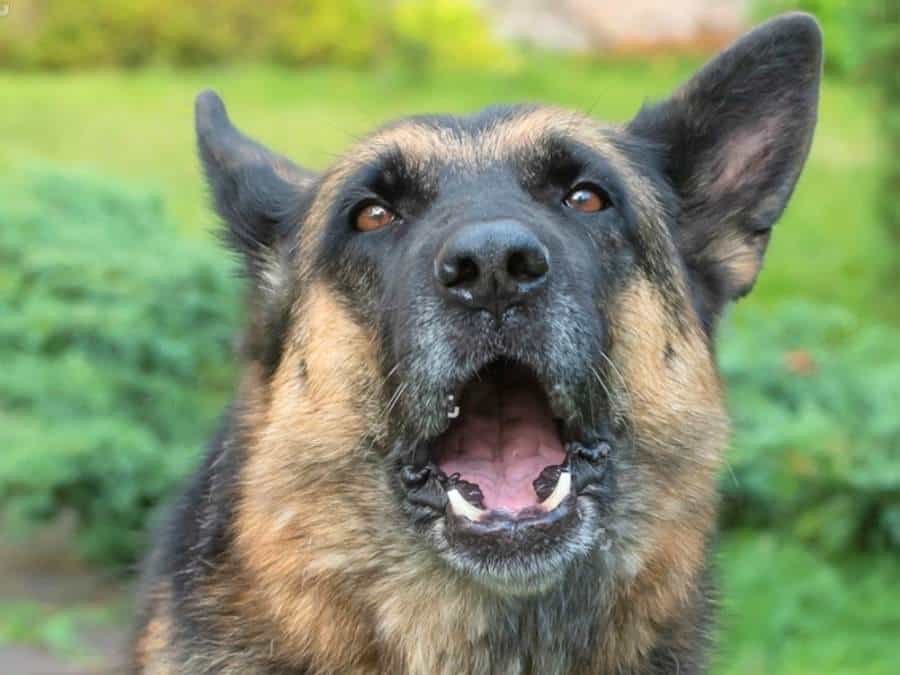Did you know that German Shepherds are known to be one of the most vocal dog breeds, and their whining behavior often leaves owners like you and me, puzzled? Understanding why these intelligent dogs whine excessively is crucial for their and your own emotional well-being.
So, in this article, we will uncover the causes of their whining and how you can comfort your pup so that it can stop whining.
Why do German Shepherds Whine So Much?
German Shepherds whine as a way to communicate their needs or desires, such as hunger, thirst, or the need to go outside. Whining can also convey a range of emotions, including anxiety, excitement, frustration, or even pain. GSDs may also whine to seek attention or to express fear or boredom.
German Shepherds are known for their vocal nature and frequently whine. Their vocalizations are a result of their social nature, emotions, and needs.
Additionally, German Shepherds use their body language to communicate with their owners and other dogs.
Barking and howling may also be used for communication, alerting potential danger, and seeking attention or comfort.
In cases where excessive whining or barking occurs, it may be a sign of a medical condition or separation anxiety, and professional help should be sought.
10 Reasons Why German Shepherds Whine
Here are some possible reasons why German Shepherds whine so much:
- Due to fear and anxiety
- As an alert signal for danger
- When they need attention
- Due to lack of exercise
- When they want to show excitement
- When they are seeking comfort
- As a means of communication with other dogs
- Due to separation anxiety
- Out of boredom or loneliness
- Due to pain
If you are a German Shepherd owner, it is vital to pay attention to your pup’s whining patterns. Assess their specific needs and provide the best ways to fulfill them.
Now let’s discuss each of these reasons.
1. Due to fear and anxiety
German Shepherds may whine due to fear and anxiety as a natural response to perceived threats or stressors in their environment.
When faced with situations that evoke fear or anxiety, such as thunderstorms, loud noises, unfamiliar surroundings, or encounters with unfamiliar people or animals, GSDs may express their unease through whining.
Whining serves as a vocalization to communicate their emotional state and seek comfort from their owners. The sound of whining can be a way for GSDs to express vulnerability and a plea for reassurance.
In some cases, fear-related whining may be accompanied by other stress behaviors, such as pacing, trembling, or seeking shelter.

2. As an alert signal for danger
German Shepherds whine as an alert signal for danger as an instinctual response deeply ingrained in their pack-oriented nature.
In the wild, where survival often depends on the ability to detect and respond to threats, dogs would use vocalizations to communicate potential dangers to their pack members.
This instinct has carried over into domesticated German Shepherds, and when they sense something amiss or potentially hazardous, whining becomes a means of alerting their human companions.
The urgency and pitch of the whining may vary based on the perceived level of threat, serving as a way for GSDs to convey a sense of caution or alarm.
3. When they need attention
Your German Shepherd may also whine when he/she needs attention, employing this vocalization as a form of communication to express their desires and draw focus to themselves.
This behavior is often rooted in the social nature of dogs, as they naturally seek companionship and interaction with their human caregivers.
When a dog feels neglected or desires engagement, they may resort to whining to capture the attention of their owners.
Whether it’s a plea for playtime, a sign of eagerness for a walk, or simply a request for affection, whining serves as a way for GSDs to convey their emotional needs.
4. Due to lack of exercise
German Shepherds may whine due to a lack of exercise as a way to communicate their surplus energy and the need for physical activity.
GSDs are highly energetic dogs with an instinctual drive to move, run, play, and explore. When their exercise needs are not adequately met, they may become restless and frustrated, leading to whining as an expression of their pent-up energy.
RELATED: How Much Exercise Does a German Shepherd Need?

5. When they want to show excitement
German Shepherds often whine when they want to express excitement, turning this vocalization into a manifestation of their exuberance and eagerness.
Whether anticipating a favorite activity, such as going for a walk or playing fetch, or upon the return of their owners after a brief absence, GSDs may emit high-pitched whines as a way to convey their enthusiasm.
This behavior is accompanied by other signs of excitement, such as wagging tails, bouncy movements, and sometimes even jumping.
RELATED: German Shepherd Signs of Affection That Will Melt Your Heart
6. When they are seeking comfort
Your GSD may whine when they are seeking comfort, using this vocalization as a means to communicate their emotional state and solicit support from their human companions.
Whether faced with a challenging situation, feeling unwell, or experiencing stress or anxiety, German Shepherds may express their need for reassurance through whining.
This behavior is often accompanied by other signs of distress, such as seeking physical proximity, nudging, or adopting a submissive posture.
In these instances, the whining serves as a form of communication, signaling a desire for comfort and security.
7. As a means of communication with other dogs
German Shepherds whine as a means of communication with other dogs, employing this vocalization as part of their intricate language to convey various messages.
In the canine world, whining serves multiple purposes, such as expressing submission, signaling playfulness, or indicating a desire for social interaction.
Puppies, in particular, often use whining to communicate their needs to their mothers and littermates.
Adult dogs may continue to use whining as a social tool throughout their lives, especially during playful interactions or to establish social hierarchy within a group.
The tone, pitch, and context of the whining convey specific messages that other dogs can interpret, allowing for effective communication within their social structure.
RELATED: Are German Shepherds Good With Other Dogs?

8. Due to separation anxiety
According to this research, your GSD may whine due to separation anxiety, a condition characterized by distress and anxious behavior when they are separated from their owners or left alone.
When a dog experiences separation anxiety, the whining is often accompanied by other signs of stress, such as pacing, excessive drooling, destructive behavior, and attempts to escape.
The whining serves as a vocal expression of the GSD’s distress, signaling their emotional discomfort and longing for the presence of their human companion.
RELATED: How To Help Your GSD Overcome Separation Anxiety
9. Out of boredom or loneliness
German Shepherds may whine out of boredom or loneliness as a way to express their dissatisfaction with a lack of stimulation or companionship. (source)
When left alone for extended periods without mental or physical engagement, GSDs may feel bored or lonely, leading to whining as an attempt to seek attention or alleviate their solitude.
Whining in these situations may be accompanied by other signs of restlessness, such as pacing, excessive chewing, or digging.
10. Due to pain
Your GSD may whine due to pain as a poignant expression of physical discomfort or distress. Whining in response to pain is a natural instinct, signaling a need for attention and assistance.
Dogs, like humans, can experience various forms of pain, whether from injuries, illnesses, or underlying health conditions.
Whining in these instances may be accompanied by other observable signs of distress, such as limping, changes in posture, or reluctance to engage in certain activities.

How to Stop German Shepherd Whining?
To address and reduce whining in your GSD, consider the following tips:
1. Identify the cause of whining
A German Shepherd may whine for various reasons, including anxiety, boredom, loneliness, pain, or attention-seeking.
Observing the context and triggers for the whining episodes will provide valuable insights into the underlying issue.
For instance, if the whining occurs when you’re about to leave, it could be a sign of separation anxiety. If it happens during playtime, it might indicate excitement.
Once you identify the cause, you can tailor your approach to address the specific need or concern.
2. Desensitize your GSD to triggers that lead to whining
If your German Shepherd whines in response to specific triggers, such as doorbells or other dogs, work on desensitizing them.
To desensitize your dog, gradually expose them to the trigger in a controlled and positive manner.
For instance, if your GSD tends to whine when encountering other dogs during walks, start by introducing them to well-behaved dogs from a distance.
Reward calm behavior with treats or praise, gradually decreasing the distance over time.
This process helps your GSD form positive associations with the trigger, teaching them that encountering the situation doesn’t lead to negative outcomes.
3. Identify & ignore your dog’s attention-seeking whining
Dogs often learn that whining attracts attention, whether it’s in the form of comforting, petting, or engaging play.
By intentionally ignoring the whining when you are certain there is no immediate need or urgency, you communicate to your German Shepherd that this behavior doesn’t lead to the desired outcome.
It’s crucial to remain consistent in ignoring the whining and wait for moments of quiet before providing attention or affection.

4. Address separation anxiety gradually
Begin by leaving your dog alone for short periods and gradually increasing the duration as your pet becomes more comfortable.
Create a positive association with your departures and returns by offering treats or toys when you leave and picking them up upon your return.
This gradual desensitization helps your dog develop confidence and reduces anxiety associated with being alone.
5. Consult with a veterinarian to rule out any medical issues
Persistent or sudden changes in whining patterns can sometimes indicate discomfort or medical concerns.
A thorough veterinary examination can help rule out any potential health problems, ensuring that your dog receives appropriate treatment if needed.
The veterinarian can assess the overall health, check for injuries, and conduct necessary tests, providing valuable insights into the root cause of the whining behavior.
If pain or medical issues are identified, appropriate interventions can be recommended, ranging from medications to specific care plans.
RELATED: German Shepherd Common Health Problems
6. Provide adequate exercise to your GSD
Adult GSDs need at least 1-2 hours of regular physical activity which not only contributes to their overall health but also helps burn off excess energy that might otherwise be expressed through whining.
A tired dog is generally a content and less anxious one. Incorporate daily walks, interactive play sessions, and mentally stimulating activities to provide the necessary physical and mental exercise.
7. Provide your dog with comfort items
Comfort items, such as favorite toys, cozy blankets, or items with the owner’s scent, provide a sense of security and familiarity.
These items can be especially beneficial in situations where dogs may feel uneasy, such as during separations or in new environments.
By associating these comfort items with positive experiences, your GSD is likely to find solace and reduce their reliance on whining as an expression of distress.
8. If whining persists, consider professional help
Professionals with expertise in canine behavior can conduct a thorough assessment to identify the root cause of the whining and tailor a training plan to address the specific needs of your dog.
They provide valuable insights, personalized strategies, and hands-on training techniques to modify behavior and strengthen the bond between you and your canine companion.
Professional help is particularly beneficial when dealing with complex issues such as separation anxiety, fear, or aggression, as these require specialized knowledge and experience.

Frequently Asked Questions (FAQs)
Do German Shepherd Puppies Whine a Lot?
Yes, German Shepherd puppies tend to whine quite a bit, especially during their early stages of development. Whining is a natural form of communication for puppies, expressing various needs such as hunger, discomfort, or a desire for attention.
It is a way for them to signal to their owners that something is amiss or that they require care. As they grow and mature, the frequency of whining typically decreases, especially with proper training and attention to their needs.
Is It Normal for German Shepherds to Whine?
Yes, it is normal for German Shepherds to whine, as it is a natural form of communication for dogs. Whining can be triggered by various reasons, including hunger, discomfort, anxiety, or a need for attention.
However, persistent or excessive whining may indicate an underlying issue that needs to be addressed, such as health concerns, stress, or insufficient mental and physical stimulation.
Why Does My German Shepherd Whine at Night?
If your German Shepherd is whining at night, several reasons could contribute to this behavior. Dogs are social animals, and they may whine due to separation anxiety or a desire for companionship.
It could also be a response to environmental factors, such as unfamiliar sounds or sights that trigger anxiety. Additionally, your GSD might be trying to communicate a need, such as the need to go outside for a bathroom break.
Why Does My German Shepherd Whine for No Reason?
If your German Shepherd is whining seemingly without reason, it may still be expressing a need or discomfort that is not immediately apparent. Dogs can whine due to boredom, stress, or a desire for attention.
It’s essential to rule out physical discomfort or health issues first by consulting with a veterinarian. Once health concerns are addressed, consider assessing the dog’s environment, routine, and mental stimulation.
Providing regular exercise, interactive play, and a structured routine can help alleviate boredom and reduce whining.
When Do German Shepherds Stop Whining?
The timeline for when German Shepherds stop whining can vary from one dog to another, but it typically decreases as they mature and undergo training.
Puppyhood is a common phase for increased whining as they learn to communicate their needs.
Through consistent training, socialization, and providing a stable environment, most German Shepherds gradually reduce their whining tendencies.
By the time they reach adulthood, many have developed effective communication skills and are more adept at expressing themselves without excessive whining.
Summary
Understanding why German Shepherds whine excessively is crucial for addressing their needs and ensuring their well-being. By recognizing the various reasons behind their whining, such as anxiety, boredom, or health issues, you can take proactive steps to minimize this behavior. Identifying and addressing the root causes, from basic needs to training techniques, is essential in managing and reducing excessive whining in German Shepherds.
FURTHER READING:




